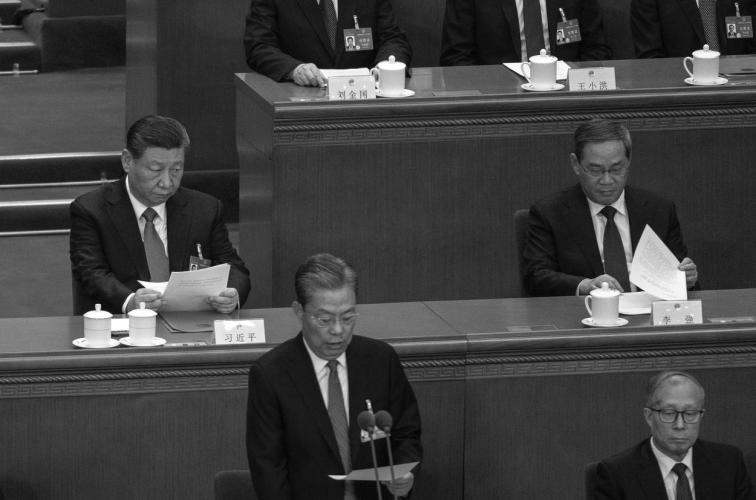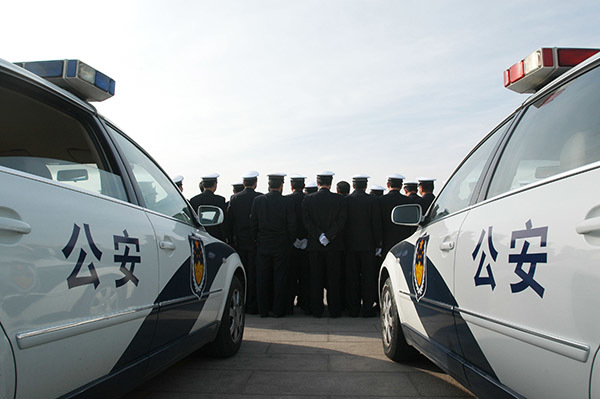Chinese leader Xi Jinping recently attended the APEC Summit, where, during the leaders ' group photo session, he stood alone at the centre of the stage, with no one approaching him for conversation, appearing visibly desolate. (Video screenshot)
[People News] On July 2, China’s Ministry of Foreign Affairs announced that Premier Li Qiang would attend the 17th BRICS Summit in Rio de Janeiro, Brazil, from July 5 to 8. This means that the Chinese Communist Party (CCP) has confirmed Xi Jinping's first-ever absence from this kind of “important international meeting” in years. With Premier Li Qiang attending a summit that Xi has never missed, he appears to have stolen the spotlight from the General Secretary. What is the hidden reason behind this unusual move?
The announcement that Li Qiang will attend the BRICS summit instead of Xi has sparked widespread speculation. Some suggest Xi is skipping Brazil because he has already visited twice, or to avoid being overshadowed by Indian Prime Minister Modi. However, this theory was quickly dismissed, since foreign affairs are not merely personal matters between heads of state. The official explanation given is a “scheduling conflict,” yet a review of all public CCP announcements shows no major commitments for Xi from July 5 to 8. Besides, if scheduling was the issue, arrangements could be adjusted—what could be more important to the CCP than BRICS?
Recently, there have been rampant rumours about Xi’s power being curtailed, with talk of a potential transfer of authority at the Fourth Plenum. At the June 30 Politburo meeting, the CCP reviewed the “Regulations on Decision-Making and Deliberative Coordination Bodies,” which many interpret as confirmation of these rumours. Analysts believe that under the new rules, Xi can no longer act entirely on his own—his role in major decisions is now orchestrated, as part of an attempt to project superficial unity in the Party. In effect, Xi has become a puppet, acting out pre-scripted moves for the sake of internal stability.
Therefore, Xi’s absence from Brazil could be a deliberate message from the new leadership, signalling to the outside world that a transition of power is underway in Zhongnanhai—Xi's authority is being reduced, and preparations are being made for a transfer of leadership.
Analysts believe the restructuring of power within Zhongnanhai is being purposefully exposed to show that Xi is no longer the sole leader, and that there is no longer a “core” named Xi. Of course, Xi wouldn’t accept this easily, nor would he feel safe leaving the country. There is a fear that he could end up like historical dictators—depart and never return. He likely wants to stay close to home to retain, secure, or even expand his remaining power.
However, according to insider sources, this is not the main reason for his absence. The real reason is that Xi’s health has deteriorated to the point where he is no longer fit for major international engagements, and may even risk humiliating himself and the regime. This isn’t just about physical health—his mental and cognitive abilities may also be impaired.
The CCP had high expectations for this BRICS summit. Therefore, sending Li Qiang must have been a carefully calculated decision, not a last-minute improvisation.
At the July 2 Ministry of Foreign Affairs press conference, a reporter asked about Beijing’s expectations for the BRICS summit. Spokesperson Mao Ning responded that China looks forward to strengthening strategic partnerships, defending multilateralism, promoting joint development, and improving global governance through “Big BRICS cooperation.” But when a journalist from India’s Press Trust asked why Li Qiang was going instead of Xi, Mao Ning dodged the question entirely, offering generic praise about the summit’s significance—clearly avoiding the true reason.
It’s obvious from the Foreign Ministry’s remarks that the CCP hopes BRICS will help diminish the United States’ dominance over global affairs, allowing China to grow its influence within a multipolar framework. All the talk of “shared development” and “cooperation” is aimed at that. As for Li Qiang, his participation is something the regime cannot openly explain—there’s no other choice.
Why no choice? Xi Jinping lives in a constant state of suspicion, power struggles, fear of losing control, and fear of retaliation. His mental condition has reportedly deteriorated—it’s not just about physical health, but possible neurological or psychological decline. Symptoms like hand tremors, involuntary nodding or tilting of the head, as seen in recent public appearances, suggest deeper issues. During a recent meeting with Singapore Prime Minister Lawrence Wong, Xi repeatedly looked down at his notes, glancing 17 times in just over a minute. In such a state, how could he possibly handle the complexities of a major international summit? This is a painful truth the CCP cannot admit—that intense internal power struggles have taken a toll on the General Secretary’s mind.
Former Inner Mongolia official Du Wen commented that Xi embarrassed himself at the 2023 BRICS summit in South Africa when his translator was forcibly removed, causing a diplomatic fiasco. If such a thing happened again, the already mentally stressed Xi might trigger an even bigger international scandal—thus, he simply can’t be allowed to attend.
China expert Wang He stated that Li Qiang’s increased presence in foreign affairs and international forums signals a gradual normalization of CCP politics following Xi Jinping’s waning power. While the system appears to function as usual on the surface, a major storm may be brewing behind the scenes.
(First published by People News)










News magazine bootstrap themes!
I like this themes, fast loading and look profesional
Thank you Carlos!
You're welcome!
Please support me with give positive rating!
Yes Sure!